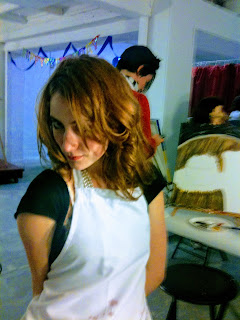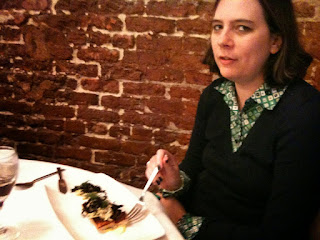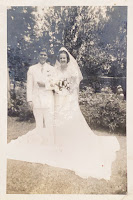
You would hardly know a snaky muddy river flows behind the levee in front of my house, but it does. I live on the Mississippi River. So did Mark Twain. But he lived further up north in Missouri where the river’s clean. Down here it’s like somebody threw up in it. It’s not like the old days though when they sold cotton and had slaves. It’s like it runs through everyone’s mind like a sewer, which isn’t so bad because we’re not that different from Paris — they’ve got great sewers. The school bus passes along the levee zillions of times and I hardly take notice that the Mississippi is right there, flowing and churning. Is it true that oak trees are swept underneath its current and that no man has ever swum across the river alive? That’s what I heard. A guy fell off the ferry once and nobody ever saw him again. I’ve been on that ferry. It takes off with a gush of brown water spewing at the back. Kind of like when I am under the water in the bathtub and push the water out with my mouth, making monstrous bubbles.
I’ve ridden the ferry a couple of times with Sidney when he would take me to Algiers. It doesn’t cost any money so it’s kinda fun to get on when you’ve got nothing else to do. Sidney told me if you notice good enough you can spot spikes, like nails, in the crevices where pigeons like to roost. Up on top where the pilot sits. The spikes keep ‘em away so there are no pigeons on the ferry, at least none that I’ve seen, and the water looks so scary from up on the balcony; I think of the oak trees floating at the bottom – or maybe a dead body, thrown into the river from a dock downstream, careening, now, through the Mississippi, like a bullet. I saw this movie once about this British lady and she like kills herself in the river and they show her body whizzing by like a submarine. It was really weird. So, it made me think that maybe they got cars down there lodged in the mud and dead bodies and stuff. Or living creatures. You never know. It's really freaky. When I was like nine, Sidney would pick me up when we were on the ferry and I could look down from the banister and see all the yellow and gray swirls and trails of rainbow-colored gas coming from the ships and stuff.
Sidney and me look at the city. He points to the places he knows. The spire of the cathedral, he points out to me. He writes down stuff in a black leather notebook he keeps in his pocket. Even though he’s a schoolteacher he tells me he’s a poet. And I believe him. We gotta squint our eyes really good because the city’s like beneath the waves and the steeples on the churches seem to barely peek out from the green hills. And I know Sidney’s a poet because he can see into my eyes and look out with me and see the same things I see on the horizon. We both see things. Like an owl fly past the car on the River Road at night. Sidney says it was a Bard owl; you can tell it by its cry, who hoots for you? it says. And we both saw it.
When I was really young my mom and dad split up. I thought my dad was going to kill my mom when he came to our house one night yelling at the doorway, yelling to come in. Mom let him in and Dad stopped shouting and started crying. I saw Dad in Mom’s arm like a child being comforted after falling off a bike or somethin’. All I heard was Mom singing like “It’s over” and Dad just cried and cried until I thought he would never stop crying. I didn’t even know my dad could cry like that.
Dad moved into a trailer and sold his truck for a Monte Carlo. I was embarrassed when he dropped me off at school on Monday after spending a weekend with him. All the cars were new and shiny. Dad’s car was flaking and the exhaust spewed out plumes of hot smoke when it idled. And the car was so long that you could see it all the way from the playground. When he finally got a better car, my brother and I volunteered to smash the Monte Carlo up with a jackhammer, but Dad wouldn't let us. In a way, I admired my dad’s love of old, huge cars, because it seemed to be genuine and I liked that. I liked that he bought a car that he could tinker with on weekends. Like I would tinker with my bike. I felt Dad and I had something in common.
The times we got along alright is when we went hunting up in Tensas Parish. You had to be real quiet or you didn’t catch anything. When I killed my first deer I was eleven years old. Dad’s voice, “You gotta learn to shoot that rifle good now” and he wouldn’t leave me alone about it until they had told him to lay off of me. “Why are you so hard on your kid?” Uncle John asked. Dad and Uncle John smeared me with that doe’s blood. Sidney said it was something like a William Faulkner novel and I told him what are you talking about? But he just said don't worry about it. I told Sidney I didn’t like the blood stuff but I knew it made me and Dad close. But I didn't like that I had to be so quiet in the deer blind because I wanted to talk and Dad would say shut up. Uncle John cut up the meat and I took some of it home and Mom and Larry made sausages. They were really good. Sidney even ate some even though he’s a vegetarian. I told him he didn’t have to but he ate one anyway. He said it tasted like the woods. I told him the whole story of killing the deer. I know he doesn’t like me hunting, but I think he minded me telling him about it. But I don't go hunting anymore because it's no fun because you can't say anything and I'd rather do stuff than just sit there all day.
When I get up in the morning Mom is really loud and she pulls the covers off my bed. I go and turn the shower on really hot and go back to bed. Mom comes upstairs and sees that I am still in bed and the shower is running really hot. She yells again and I yell back. Anger is the only thing that gets me up. I yell and scream and she tells me I’m too young to have a temper tantrum. I would never do that with my dad, she says. She’s right. Dad makes me say, “Yes sir. No sir.” Mom doesn’t make me say that but I wonder sometimes if she really loves me. I know she does, though.
I walk to the bus stop at like six thirty in the morning. On the levee they don’t pick you up in front of your house. The bus never veers off the route on River Road. Redeemer Middle School is in Destrehan five miles away but it’s still on the River Road. I hate school because people make fun of me. And it’s so boring too. Why do I need to know all this stuff anyway? And when I go to sit down at lunch I can never find a place to sit. They say you’re supposed to learn from your mistakes, but I didn’t do anything wrong. I looked on a map and River Road goes for hundreds of miles. All the way to Baton Rouge. I think they call it the Great River Road. And you can hardly see the river. You gotta climb up the levee and look out. You can see big ships with Russian written on the side in big letters and Greek written on the sides. In Kenner I went with Sidney and you can see where some pirate landed and we ate sandwiches there, once. We had walked all the way from our house and mom had to come and pick us up.
But, on our bus, I sit at the very first seat, my head cocked sideways on the windowpane, the visceral bumps shocking through my scrunched legs, propped against Miss Thibodeaux’s driver’s seat, her weight balancing my scrawny, elementary frame so she barely notices. Clay and Sparrow sit behind me, swapping MAD magazines. We like to find the funniest pictures so we can try to imitate ‘em and send in an idea of our own one day. I don’t draw but Clay does. Sparrow has ideas and so do I but Clay’s really good at putting it down in words.
Usually, we all get off at Clay’s stop.
The bus lurches to a halt at the corner of Leander and River Road and all three of us climb out like children coming home from the crusades. With the stop sign still blinking red on Miss Thibodeaux’s Yellow Bird, we walk in front and I wave. Throwing our stuff down on the green grass we’ll roll down the levee to the soft mud at the bottom. We’re finally free.



























